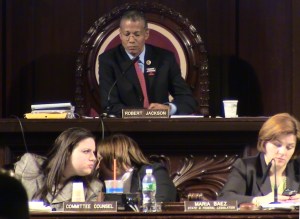 On Friday, Nov. 20, Councilman Robert Jackson was exasperated.
On Friday, Nov. 20, Councilman Robert Jackson was exasperated.
The Harlem Democrat had put in a call to the chair of the Council’s Small Business Committee, David Yassky, asking for a vote on the Small Business Survival Act, a bill of Mr. Jackson’s that would regulate commercial rents.
“I told David today on the phone, I said, ‘David, everyone who testified spoke in favor of the bill,’” Mr. Jackson said. “I asked him to just vote it out,” he went on. “It can be put on the calendar to be voted out. Period. He’s not willing to do that.”
This didn’t sit well.
“What are people afraid of?” Mr. Jackson said. “Let people stand up and say, ‘Yes, I’m in favor of it,’ or, ‘No, I’m not.’”
With a month left before the current Council term ends and legislation expires, Mr. Jackson is scrambling to bring his bill to a vote—it has the official support of 30 of 51 members—making noise, threatening and pressuring fellow members to help him move on his top priority. The main resistance comes from Speaker Christine Quinn—Mr. Jackson said Mr. Yassky was deferring to her on a vote as is customary—who says she believes the bill would be ruled illegal by the courts.
“We can’t pass laws that we don’t have the legal authority to implement,” Ms. Quinn said in a phone interview Monday. “That isn’t right. It isn’t fair, doing something that you know, five minutes after you do it, that the rug is going to get pulled out from under it.”
Mr. Jackson’s unusually strong push has sent a jolt of fear through the real estate world that had, until recently, paid the bill little attention, and industry advocates are now working to erode the bill’s support on the Council (though they do not seem to think there is much threat that the bill will come up this year). Landlord groups balk at the mere mention of new regulation on commercial rents, and seem to find Mr. Jackson’s legislation nauseating.
THE BILL IS DUBBED commercial rent control by both supporters and opponents, but in actuality is a bit less extreme. It would require binding arbitration between small commercial tenants—retail or office—and their landlords if the two cannot agree on the price and terms of a new lease. The arbitrators would rule on a number of factors, including the landlord’s ability to pay expenses and the tenant’s ability to move to determine what the new lease should be.
This legislation has made a showing in the Council before: The bill is essentially the same as one pushed in the mid- to late-1980s by West Side Democrat Ruth Messinger, who, like Mr. Jackson, had the support of most of the Council; she failed to win over the speaker or the mayor.
The bill’s backers, led by a large set of minority business owners, call it absolutely essential for the survival of small businesses in the city. Landlords’ ability to dramatically raise rents after a lease expires forces far too many neighborhood stores to shutter, the advocates say, leaving streets with a limited and unhealthy variety of retail.



